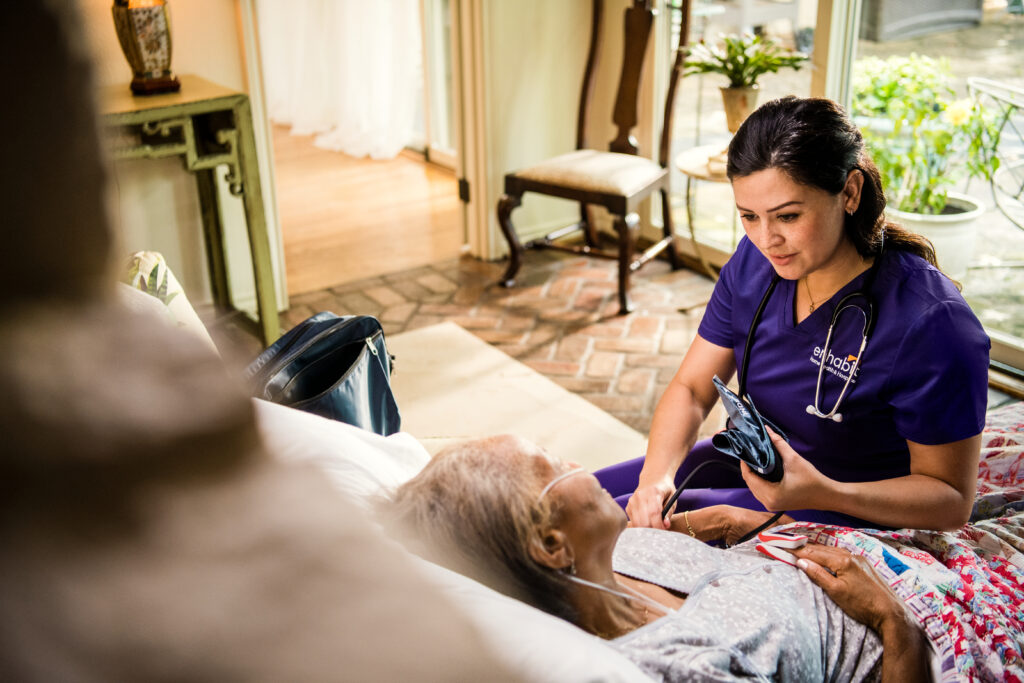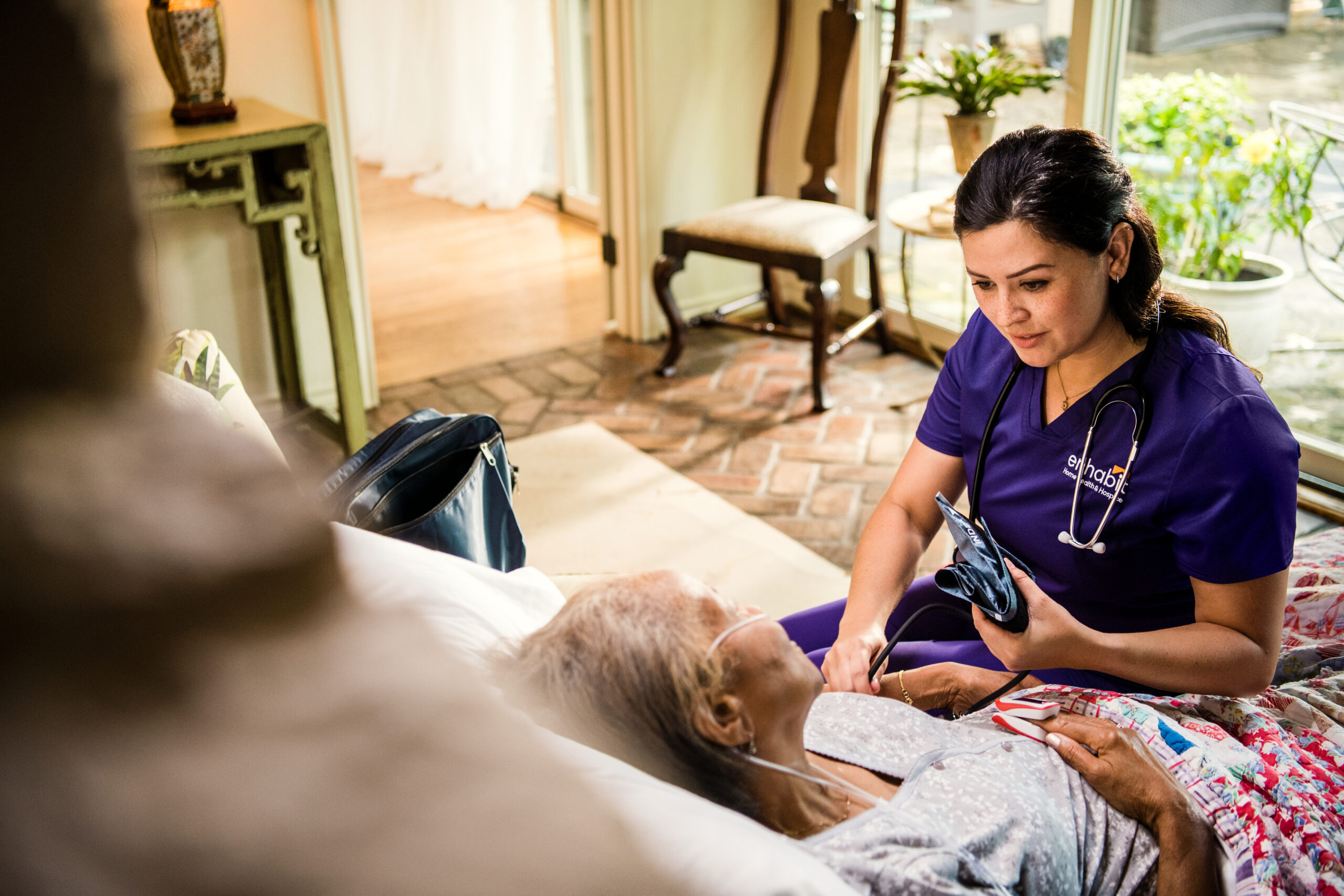Imagine being able to make a difference in someone’s level of comfort and peace as they transition to the end-of-life. Hospice nurses, like Melissa at Enhabit Home Health & Hospice, get to make that special impact first-hand with the compassionate care they provide to hospice patients.
“I strive every day to make a difference in my patients’ lives and not just go in and be routine with my nursing duties. I try to treat all of my patients like my own family – I really do.”

What is a hospice nurse?
Hospice nurses have the same certifications as a nurse who may work in a hospital, physician’s office or even in home health care. They are licensed professional nurses (LPN), licensed vocation nurses (LVN) or registered nurses (RN).
Not only do hospice RNs provide direct patient care, but they also serve as case managers who oversee and direct care provided by LPNs and LVNs. They ensure that the overall care from all team members is meeting the patient’s needs.
And while hospice nurses have the ability to provide one-on-one care to patients in their homes, they are mainly focused on helping their patients comfortably navigate the end-of-life journey.

What’s the difference between a hospice nurse and a home health nurse?
Home health nurses provide skilled nursing care that helps patients recover. These services may include assessment and teaching on disease processes, medication management including IV and injectable medication administration, managing safety precautions, wound care, and providing skilled treatment such as catheter or ostomy care.
Hospice nurses provide that same skilled nursing care. But their focus is on keeping the patient comfortable as opposed to treating and improving the patient’s illness.
“Home health is more goal-oriented,” Melissa said. “In hospice, your goals are different. It’s more about the patient’s comfort and needs in the moment, as they transition. I really strive to get to know the patient’s history and what they liked when they were growing up. Then, I try to implement that into their care so they feel more comfortable.”
What does a hospice nurse do?
Hospice nurses play an important role in keeping a patient comfortable at the end of life. They provide whatever skilled nursing services are required to meet the patient’s needs. They also coordinate care with all other members on the interdisciplinary care team. This includes social workers, hospice aides, chaplains, volunteers and therapists.
Additionally, they ensure implementation of the patient’s personalized care plan and provide disease progression education to both the patient and caregivers.
While hospice nurses are experts in pain and symptom management, Melissa says it is much deeper than just being able to assess patient needs.
“It is more than just using your immediate nursing skills,” she said. “It is more than just obtaining vitals and reviewing medications. It’s about listening to their cues and building trust and communicating on several different levels – educational levels, cultural backgrounds, socioeconomic classes. People are so different. You have to be able to pick up on their cues about their health despite their differences in background to learn more about if they’re feeling pain or how to make them comfortable.”
What is it like to be a hospice nurse?
Melissa has witnessed a lot in her 17 years as a hospice nurse. She had a recent patient who was actively dying but progressing rather slowly.
Although his whole family was there, she asked them if there could be anyone else her patient was waiting on to say goodbye. Lo and behold, the patient had an estranged wife whom nobody had spoken to in years due to her health issues.
“At that moment, something took over me. I got on the phone and explained the situation to the patient’s wife’s caregiver even though he had no idea who I was,” Melissa said. “He ended up putting her on the phone. She started talking to my patient. She told him how much she loved him and how she wanted to express her love for him before he died.”
And within a few hours, the patient passed away.
“The family was so thankful. They truly felt like he was waiting on her to tell him goodbye,” Melissa said.
That’s just one example of the types of experiences Melissa has on a daily basis. Working as a hospice nurse, she witnesses special moments all the time. And these moments mean as much to her as they do her patients and their loved ones.
“Hospice is my calling in life. I don’t wake up in the morning and feel like I have to work. I am blessed to get to do what I do. These patients make as much of an impact on my life as hopefully I do theirs.”
How do I start my career?
Hospice nursing was the perfect fit for Melissa. For others who think their calling might be in hospice nursing too, Melissa wants you to know that it isn’t easy, but it is the most rewarding job you can imagine.
“It’s not easy because we deal with the realness of death,” she said. “But to me, death is not the end and so I don’t look at it that way. I look at it as me just being a part of their transition and how rewarding it is to get to be a part of that stage. For any nurse that’s wanting to get into the hospice field, it is by far the most rewarding job I’ve ever had. I can’t imagine doing anything else.”
The path to hospice nursing is the same educational path any nurse would follow. You must first have a bachelor’s degree in nursing. If you are applying to an RN position, you must also be currently registered as a RN.
If you are an LPN or LVN interested in hospice, you must be currently registered as such in your state of employment. Generally, hospice nurses have a minimum of one year of experience in a clinical setting prior to starting their hospice journey.
At Enhabit, hospice nurses enjoy flexibility and a vast amount of professional development opportunities.
To learn more about hospice career opportunities at Enhabit, search our open career opportunities near you or sign up for job alerts by texting “CARE” to 98199.
 Back to Resource library
Back to Resource library
Browse top categories
Social Share
At Enhabit our patients are our number one priority. From providing the latest medical practices to building deep personal connections, we’re focused on upholding every patient’s dignity, humanity and sense of control on their health care journey.
Home health
Our home health services give patients access to the care they deserve in the comfort of their own homes. From disease and injury management to recovery from surgery, our clinicians help patients confidently achieve their healthcare goals.
Hospice care
Our hospice care services place importance on the comfort of every patient living with a terminal illness. Our caring professionals are dedicated to providing not just physical care, but spiritual and emotional support to every patient and their loved ones.






